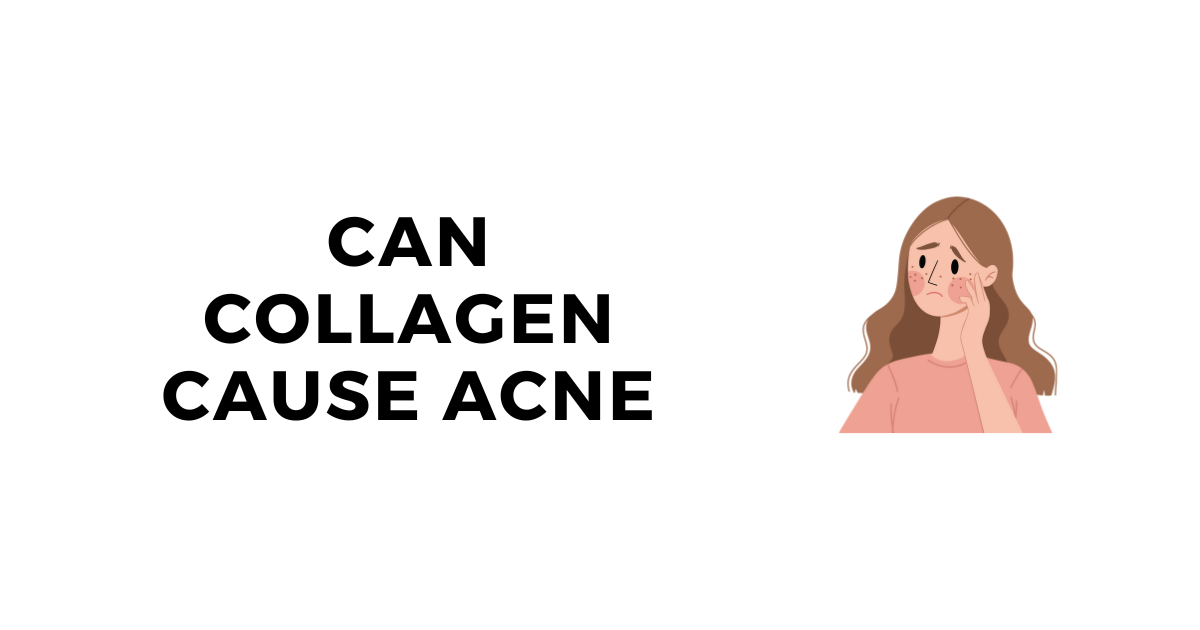
Can Collagen Cause Acne? The Best Way to Avoid It - Supplement or Powder
Can Collagen Cause Acne?
Like many others, I wanted to achieve luscious locks and gorgeous nails. Who wouldn’t? Inspired by a study that hailed collagen as a magical elixir, I jumped on the bandwagon.
The results were pretty impressive. My once-dull hair gained an enviable sheen. My nails broke less often. It seemed that this collagen craze was indeed the real deal - or so I thought.
Just when I thought I’d stumbled on something awesome, I noticed a sudden eruption of acne on my previously clear skin. Panic set in. Was it the collagen? I really didn’t want to give it up.
I delved into a flurry of research, determined to unravel the mysterious connection between collagen and acne. I had to know if collagen was bad for me and whether I should keep taking it.
In this article, we'll dive into the world of collagen and its myriad benefits for the body, including the skin. We'll debunk common misconceptions, explore the science behind its positive effects and unveil the truth about how collagen can enhance your natural beauty… and answer the question, can collagen cause acne?
Did Collagen Cause my Acne
Contrary to my apprehensions, collagen was not the culprit behind my acne ordeal. In fact, I stumbled upon numerous scientific studies that actually extolled the virtues of collagen for skin health.
It turns out that collagen plays a vital role in maintaining skin elasticity, reducing the appearance of wrinkles, and even promoting a youthful glow.
While there may be anecdotal reports on reddit or other websites suggesting a connection between collagen and acne breakouts, scientific evidence does not support this claim.
In fact, a study published in the National Library of Medicine in 2019 found that collagen improves skin hydration and elasticity (1).

So, what caused my acne outbreak?
It turned out to be a case of coincidence rather than cause and effect. As I dug deeper, I learned that certain factors unrelated to collagen consumption, such as hormonal fluctuations or lifestyle changes, can trigger acne breakouts.
Fortunately, my skin swiftly bounced back to its former radiance once I addressed those underlying factors. And you know what? My skin is now better than ever! The collagen I took for healthy hair and nails turned out to offer benefits for skin too.
Now, both my acne is gone AND my skin is tighter. I did find that some supplements worked better than others. Read my list of the best collagen supplements for sagging skin.
Where Did the Myth of Collagen Causing Acne Come From?
The myth that collagen causes acne might have originated from personal experiences or stories you may have come across online. Perhaps you've encountered individuals who believed there was a link between collagen supplementation or treatments and the occurrence of acne breakouts.
These anecdotes can spread quickly through word of mouth or online discussions, leading to misconceptions. If only news of the benefits of collagen spread so easily!
Scientific research does not support the idea that collagen causes acne. In fact, a study published in the National Library of Medicine in 2012 found that collagen improves acne scars (2).
Benefits of Collagen for Acne
The benefits of collagen for acne include reducing scars, improving elasticity, hydration, a protein source, reduced inflammation, immune boosting benefits and the antioxidant effects of this unique protein.
Read on and I'll explain each of these benefits below for you.
1. Reduce the appearance of scars and skin bumps
Using collagen supplements or treatments can benefit you by potentially reducing the appearance of scars and skin bumps caused by acne.
By enhancing the skin's elasticity and promoting collagen production, it may help smooth out scars and minimize the visibility of bumps caused by acne.
2. Improve skin hydration and elasticity
Collagen products or supplements can help to enhance the moisture levels in your skin, making it appear more hydrated and plump.
This can contribute to a smoother and more youthful complexion. Additionally, collagen plays a crucial role in maintaining the elasticity of your skin, which is essential for keeping it firm and resilient.

By promoting collagen production, you can potentially see improvements in the elasticity of your skin, helping to reduce the appearance of fine lines and wrinkles. A sweeping systematic review of oral collagen supplementation for dermatological applications published in the Journal of Drugs in Dermatology in 2019 found important clinical applications for oral collagen supplementation for wound healing and skin aging (3)
3. Collagen supplements can be used as a skin-clearing aid
Collagen supplements provide your body with essential amino acids and nutrients that support overall skin health. By promoting collagen production, these supplements help strengthen your skin's barrier function, reduce inflammation and support the healing process of acne-related issues.
Additionally, collagen can contribute to maintaining a balanced skin tone and texture, giving you a clearer and more even complexion.
4. Can be used to supplement protein in the diet (although not complete)
When you use collagen as a dietary supplement, it can provide you with non essential amino acids that support various functions in your body, including skin health.
Collagen is a rich source of specific amino acids like glycine, proline and hydroxyproline, which are important for maintaining the structure and integrity of your skin, as well as supporting the growth and repair of other tissues, according to Cleveland Clinic (4).
Keep in mind that collagen is not considered complete protein, so you cannot rely on it as your sole protein source.
5. Reduce the appearance of wrinkles
As you age, the natural collagen production in your skin decreases, leading to the formation of wrinkles and fine lines.
By incorporating collagen into your skincare routine, you can potentially enhance the elasticity and firmness of your skin, which can help diminish the visibility of wrinkles.
Collagen acts as a building block for your skin, providing structural support and promoting a smoother complexion. It can also help improve skin hydration, leading to plumper and more youthful-looking skin.

Regular use of collagen-based skincare products or supplements may contribute to a reduction in the appearance of wrinkles, giving you a more radiant and rejuvenated appearance.
6. Increase the strength and mass of skin tissue
Collagen provides your skin with the necessary building blocks to support its structure and integrity. That's because it is a key protein that helps maintain the strength and resilience of your skin, acting as a foundation for its tissues.
By promoting collagen production, you can potentially enhance the density and thickness of your skin, which can contribute to a firmer and more youthful appearance.
Additionally, it supports the formation of new skin cells, aiding in the repair and regeneration of damaged or aging skin tissue.
7. Support the growth of hair, nails and teeth
Collagen can play a significant role in supporting hair growth as well as nails and teeth. That’s how I got started taking it! It worked for me.
For hair, collagen is thought to strengthen the hair follicles and promote hair growth. It can contribute to healthier and more resilient strands, reducing issues like breakage and brittleness.
When it comes to nails, collagen can enhance their strength and promote their growth. By maintaining the integrity of the nail bed, collagen can help prevent issues like weak or brittle nails and support their overall health.
It also plays a role in supporting the health of your teeth. It contributes to the structure of the gums and jawbone, providing a strong foundation for your teeth.

By supporting the growth and maintenance of these oral tissues, collagen can contribute to overall oral health. A study published by the International Journal of Periodontics & Restorative Dentistry in 2011 even found applications for collagen in significant dental grafts (5).
To harness the benefits of collagen for your hair, nails and teeth, you can consider incorporating collagen-rich foods into your diet or using collagen supplements or products specifically designed for hair, nails and oral health.
8. May reduce inflammation in your skin
Collagen has amino acids like glycine and proline, which have anti-inflammatory properties. These properties can help alleviate redness, swelling and irritation associated with inflammatory skin conditions.
In addition, collagen can support the healing process of your skin by promoting tissue repair and regeneration. By nourishing your skin with collagen, you can potentially enhance its ability to recover from inflammation and maintain a healthier and more balanced complexion.
9. Support for digestive, metabolic and immune systems
Collagen helps to support the integrity of the gut lining and promote a healthy digestive process. It can aid in soothing and repairing the intestinal lining, which may help alleviate digestive issues such as leaky gut syndrome and inflammation.
Some people may notice that they seem to poop from collagen. This may happen as your digestive system gets on a more regular schedule.
The amino acids found in collagen are essential for the production and maintenance of lean muscle mass, which can contribute to an efficient metabolism and healthy weight management.
Looking for a supplement recommendation? Read my guide to finding the best collagen powder for weight loss.
10. Reduce oxidative stress in the body
Oxidative stress occurs when there is an imbalance between the production of free radicals and the body's ability to neutralize them. This imbalance can lead to cellular damage and contribute to various health issues.
Collagen, with its rich amino acid profile, has antioxidant properties that can help counteract the harmful effects of oxidative stress.
By consuming collagen, you provide your body with essential nutrients that support the body's natural defense against free radicals.
Finally, collagen is involved in the production of other antioxidant molecules in the body, such as glutathione. These antioxidants help protect your cells from oxidative damage and maintain overall well-being.
Collagen Tips for Acne
My top collagen tips for acne are to eat collagen boosting foods, drink bone broth and if all else fails, consider a collagen peptides supplement.
Eat Collagen Boosting Foods
To support your acne-prone skin, incorporating collagen-boosting foods into your diet is my number one tip! These foods provide nutrients that promote collagen production, which helps you get glowing skin.

- Include foods rich in vitamin C, as it plays a crucial role in collagen synthesis. Citrus fruits, berries, bell peppers and leafy greens are excellent sources of vitamin C.
- Consuming foods high in amino acids glycine and proline such as pork rinds, fish, tough cuts of meat (roasts), and meat on the bone (wings, drumsticks, oxtail, ribs).
- Omega-3 fatty acids, found in fatty fish like salmon and walnuts, can help reduce inflammation in the skin, which is beneficial for acne-prone skin.
- Bone broth, made from simmering animal bones, is a collagen-rich food that can be incorporated into soups or used as a base for other dishes. My favorite for this is the low sodium bone broth from Bluebird Provisions.
Remember, it’s hard to get too much collagen, and very difficult to eat too much collagen, so enjoy and eat up. However, make sure you know the symptoms of too much collagen, just in case.
In addition to eating collagen-boosting foods, maintaining a balanced diet with a variety of nutrients is important for overall skin health.
Drink Bone Broth
Bone broth is a collagen-rich drink that provides essential nutrients to promote healthier skin. Because it’s tasty and easy to add to any diet, it’s one of the best natural collagen sources.
Drinking bone broth can supply your body with collagen, amino acids and minerals that support skin health. Bone broth also has other nutrients like glucosamine, chondroitin and hyaluronic acid, which can contribute to skin hydration and overall skin health.
Including bone broth in your diet may help reduce inflammation in the body, including inflammation associated with acne. This can potentially lead to a clearer complexion and improved skin condition.
You can enjoy bone broth on its own or use it as a base for soups, stews, or other dishes. You can also find pre-made bone broth or make it yourself by simmering bones for an extended period.
Collagen Peptide Supplements
Collagen peptide supplements are derived from collagen sources and are typically available in powder or capsule form. By taking these supplements, you can provide your body with the necessary amino acids and nutrients to support collagen production.
Regular consumption of collagen peptide supplements may help improve the overall health and appearance of your skin. They can help strengthen the skin's structure, promote elasticity and support the healing process of acne-related issues.
When choosing collagen peptide supplements, opt for high-quality products from reputable brands. Look for supplements that are specifically formulated for skin health or acne support.
10 Reasons Why You Get Acne
You get acne because of clogged pores, irritated skin, autoimmune issues, poor skin texture, poor diet, hormonal changes and oxidative stress
1. Clogged Pores
Excess oil production, known as sebum, can contribute to clogged pores. This can happen due to hormonal changes, genetics, or certain medications.
In addition, dead skin cells that are not effectively shed can accumulate on the skin's surface and mix with oil, further contributing to pore blockage.
When your pores are clogged, bacteria can thrive in this environment, leading to inflammation and the development of acne lesions such as blackheads, whiteheads, pimples, or cysts.
To help prevent clogged pores, it's important to maintain a consistent skincare routine. This includes cleansing your face twice a day, using non-comedogenic (non-pore-clogging) skincare products and exfoliating regularly to remove dead skin cells.
Avoiding the use of heavy cosmetics or skincare products that can potentially clog your pores is also beneficial.
2. Irritated skin
One of the reasons why you may experience acne is due to irritated skin. When your skin becomes irritated, it can lead to inflammation and breakouts.
There are several factors that can contribute to skin irritation:
- Harsh Skincare Products: Using skincare products that contain harsh ingredients or are not suitable for your skin type can irritate your skin. This can disrupt the skin's natural balance and trigger acne breakouts.
- Friction and Rubbing: Constant rubbing or friction on the skin, such as from tight clothing, helmets, or constant touching of the face, can lead to skin irritation and potentially aggravate acne.
- Allergens and Sensitivities: Your skin may react negatively to certain allergens or irritants, such as certain fabrics, fragrances, or environmental factors. This can cause inflammation and trigger acne flare-ups.
- Over-cleansing or Over-exfoliating: While it's important to keep your skin clean, over-cleansing or over-exfoliating can strip away the skin's natural oils and disrupt its protective barrier. This can result in skin irritation and increased vulnerability to acne-causing bacteria.
To help prevent irritated skin and minimize acne breakouts, consider the following tips:
- Use gentle and non-comedogenic skincare products suitable for your skin type.
- Avoid excessive scrubbing or harsh exfoliation.
- Be mindful of potential allergens and irritants in your environment or skincare routine.
- Keep your skin clean but avoid over-cleansing.
- Avoid touching your face frequently and be mindful of friction-causing factors.
3. Autoimmune Issues
Your immune system plays a crucial role in protecting your body from harmful substances and fighting off infections. However, in some cases, your immune system can become overactive and mistakenly target healthy cells in your skin, leading to inflammation and the formation of acne.
If you have autoimmune issues, your immune system may be prone to launching an attack on your own skin cells. This can result in the clogging of hair follicles, the production of excess sebum (oil), and the proliferation of acne-causing bacteria. As a result, you may notice the formation of pimples, blackheads, or whiteheads on your face, chest or back.
4. Poor Skin Texture
When your skin has a rough or uneven texture, it can trap dead skin cells, oil and bacteria in your pores. This can lead to clogged pores, which then become inflamed and result in the formation of pimples, blackheads, or whiteheads.
Additionally, poor skin texture can make it more challenging for your skin to shed dead cells properly, further contributing to the development of acne.
There are several factors that can contribute to poor skin texture and, subsequently, acne. One common cause is the accumulation of dead skin cells on the surface of your skin.
These dead cells can create a barrier that prevents your skin from breathing and renewing itself effectively. As a result, acne-causing bacteria can thrive, leading to breakouts.
Other factors that can contribute to poor skin texture include hormonal imbalances, excessive oil production, environmental factors (such as pollution or humidity), and improper skincare routines. Lack of exfoliation or using harsh products can also disrupt your skin's natural texture and contribute to acne formation.
5. Poor Diet
The foods you consume can have a significant impact on your skin health and contribute to acne breakouts. Here are some common ways a poor diet can contribute to acne:
- High Glycemic Index Foods: Consuming foods that are high in refined carbohydrates and sugars can cause your blood sugar levels to spike. This can lead to increased insulin production, which may stimulate oil production in your skin and contribute to clogged pores.
- Dairy Products: Some studies suggest that certain dairy products, particularly those with high levels of hormones, can potentially aggravate acne. These hormones may disrupt your body's natural balance and contribute to the development of acne.
- Processed and Junk Foods: Foods that are highly processed, greasy, or high in unhealthy fats can promote inflammation in your body. Inflammation can worsen acne and contribute to other skin issues.
- Lack of Essential Nutrients: A diet lacking in essential nutrients, such as vitamins, minerals and antioxidants, can impact your skin health. These nutrients play a vital role in maintaining healthy skin and preventing acne.
6. Hormonal Changes
During certain periods of your life, such as puberty, menstrual cycles, pregnancy, or menopause, hormonal changes occur in your body. These changes can affect the production of sebum, an oily substance that can clog your pores and lead to acne.
Hormonal acne is often characterized by breakouts around the chin, jawline and other areas where oil glands are more active. It can be influenced by factors such as:
- Increased Androgen Levels: Androgens, including testosterone, can stimulate the sebaceous glands to produce more sebum. Higher levels of androgens, whether due to natural hormonal changes or certain medical conditions, can contribute to acne development.
- Menstrual Cycle: Many women experience acne flare-ups during certain phases of their menstrual cycle. Hormonal shifts, particularly an increase in progesterone, can trigger sebum production and result in acne breakouts.
- Hormonal Birth Control: Some forms of hormonal birth control, such as oral contraceptives, can help regulate hormone levels and improve acne. However, for some individuals, hormonal birth control can also lead to temporary acne breakouts during the adjustment period.
- Hormonal Imbalances: Conditions like polycystic ovary syndrome (PCOS) can cause hormonal imbalances, including elevated androgen levels. These imbalances can contribute to persistent acne.
7. Oxidative Stress and Free Radicals
Oxidative stress occurs when there is an imbalance between free radicals and antioxidants in your body. Free radicals are unstable molecules that can damage cells, including those in your skin.
When free radicals accumulate, they can trigger inflammation and disrupt the normal functioning of your skin, potentially leading to acne breakouts.
Exposure to pollutants, UV radiation and toxins in the environment can generate free radicals in your skin. These harmful molecules can promote inflammation and contribute to acne development.
Certain lifestyle choices, such as smoking, excessive alcohol consumption and a poor diet high in processed foods and lacking in antioxidants, can increase oxidative stress in your body. This can have negative effects on your skin, including acne.
Are there any collagen products that are safe for acne-prone skin?
Yes, there are collagen products available that are considered safe for acne-prone skin. Consider collagen supplements in the form of capsules, powders, or liquids.
These types of products are typically ingested orally, bypassing direct contact with the skin and reducing the likelihood of clogging pores or causing breakouts.
If using a topical treatment, look for non-comedogenic products. They’re formulated to not clog pores, making them less likely to contribute to acne breakouts.
Some collagen products may contain additional ingredients such as sugars, artificial sweeteners, or additives that could potentially worsen acne-prone skin. Read the product labels carefully and opt for collagen supplements with minimal additives or unnecessary ingredients.
Is collagen safe to take if you have allergies?
Collagen can be derived from various sources, including marine (fish), bovine (cow), porcine (pig), or poultry (chicken). If you have known allergies or sensitivities to any of these sources, it's essential to avoid collagen products derived from those specific sources.
Furthermore, collagen products may contain additional ingredients, such as flavorings, sweeteners, or preservatives, which can potentially trigger allergic reactions.
It's crucial to carefully review the ingredient list of any collagen product you consider and avoid those containing known allergens.
Closing Thoughts
If you are struggling with acne, you may want to consider taking a collagen supplement. Collagen supplements do not cause acne in most people.
However, it is important to do your research and read my in depth guide to collagen supplements.
If in doubt, you should always consult with your doctor to find the best supplement for you. You can also try some natural remedies, such as improving your diet and lifestyle habits.
Disclaimer: this information is for educational purposes only and has not been evaluated by the FDA or CFIA. It is not intended to diagnose, treat, cure, or prevent any disease. Please consult your primary care physician for advise on any of this.
Sources
- https://www.ncbi.nlm.nih.gov/pmc/articles/PMC6835901/
- https://pubmed.ncbi.nlm.nih.gov/23216209/
- https://jddonline.com/articles/oral-collagen-supplementation-a-systematic-review-of-dermatological-applications-S1545961619P0009X/
- https://my.clevelandclinic.org/health/articles/23089-collagen
- https://web.p.ebscohost.com/abstract?direct=true&profile=ehost&scope=site&authtype=crawler&jrnl=01987569&asa=Y&AN=64464649&h=%2b3FsEAzycEDd%2bs8H8STVE7FMvxWVTNf33GN2RYSUBlo5W2T9eArJrYE7QhoMvt%2bYW91xv35OvL9z4a9mtfzG5g%3d%3d&crl=c&resultNs=AdminWebAuth&resultLocal=ErrCrlNotAuth&crlhashurl=login.aspx%3fdirect%3dtrue%26profile%3dehost%26scope%3dsite%26authtype%3dcrawler%26jrnl%3d01987569%26asa%3dY%26AN%3d64464649

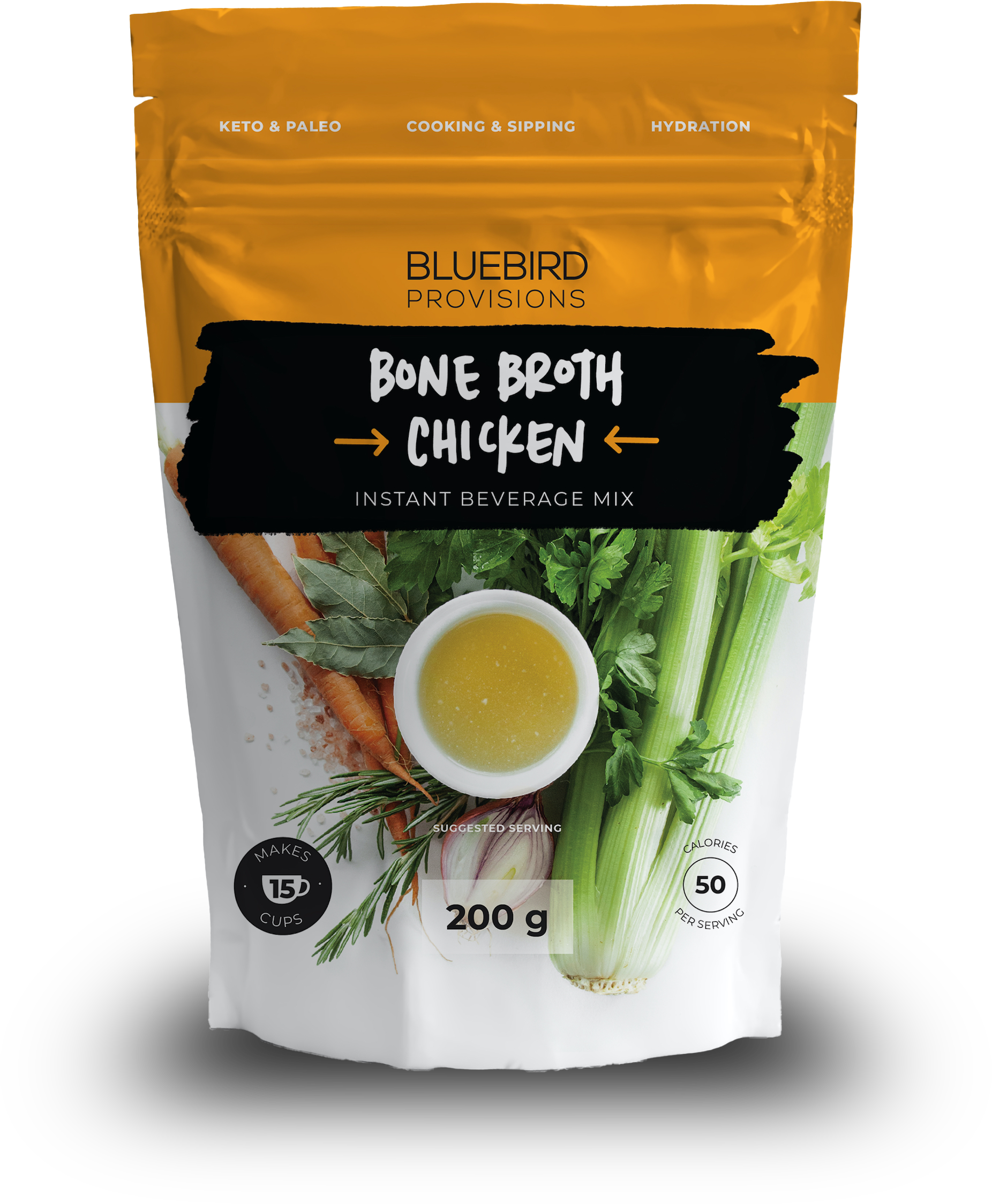
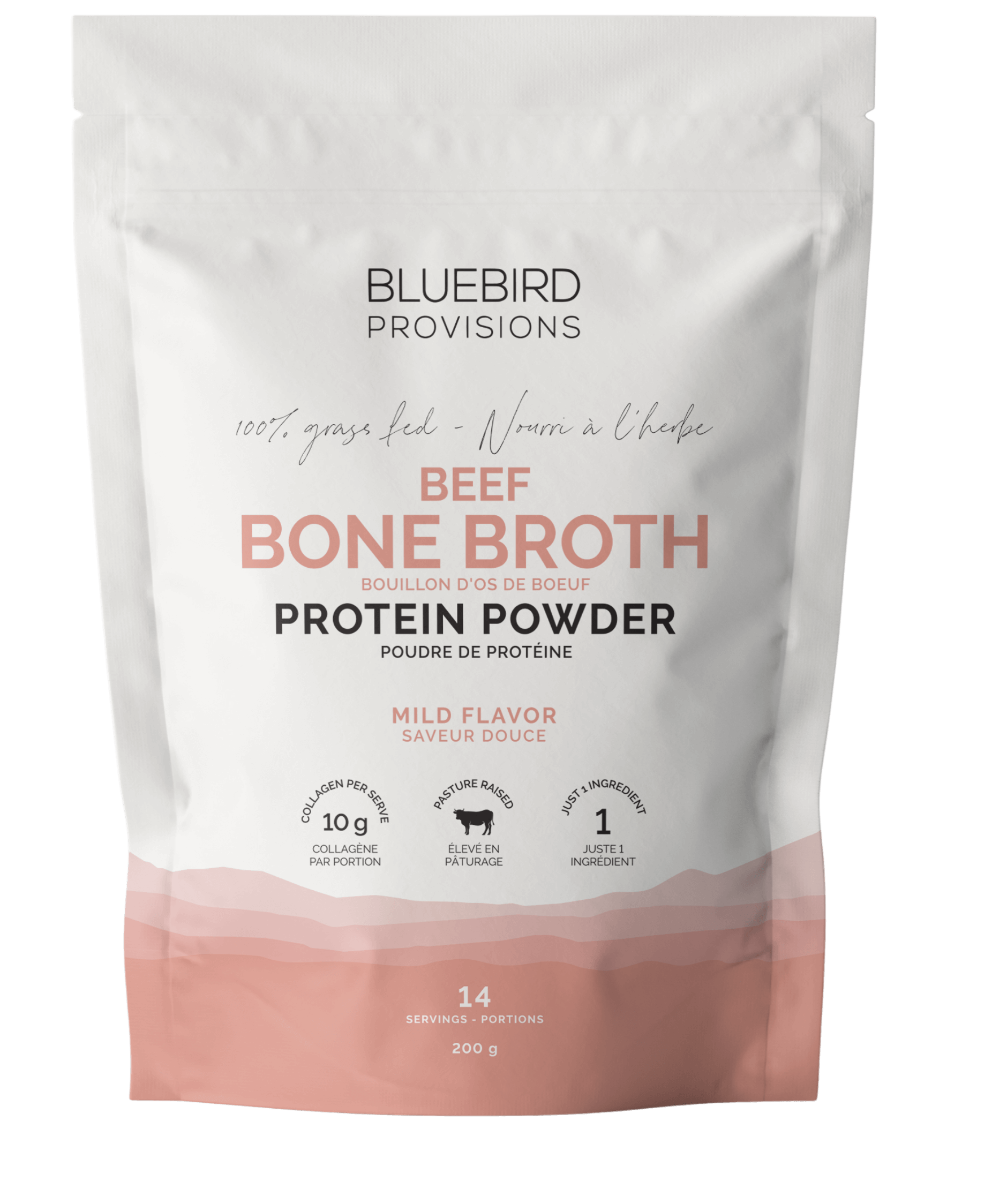

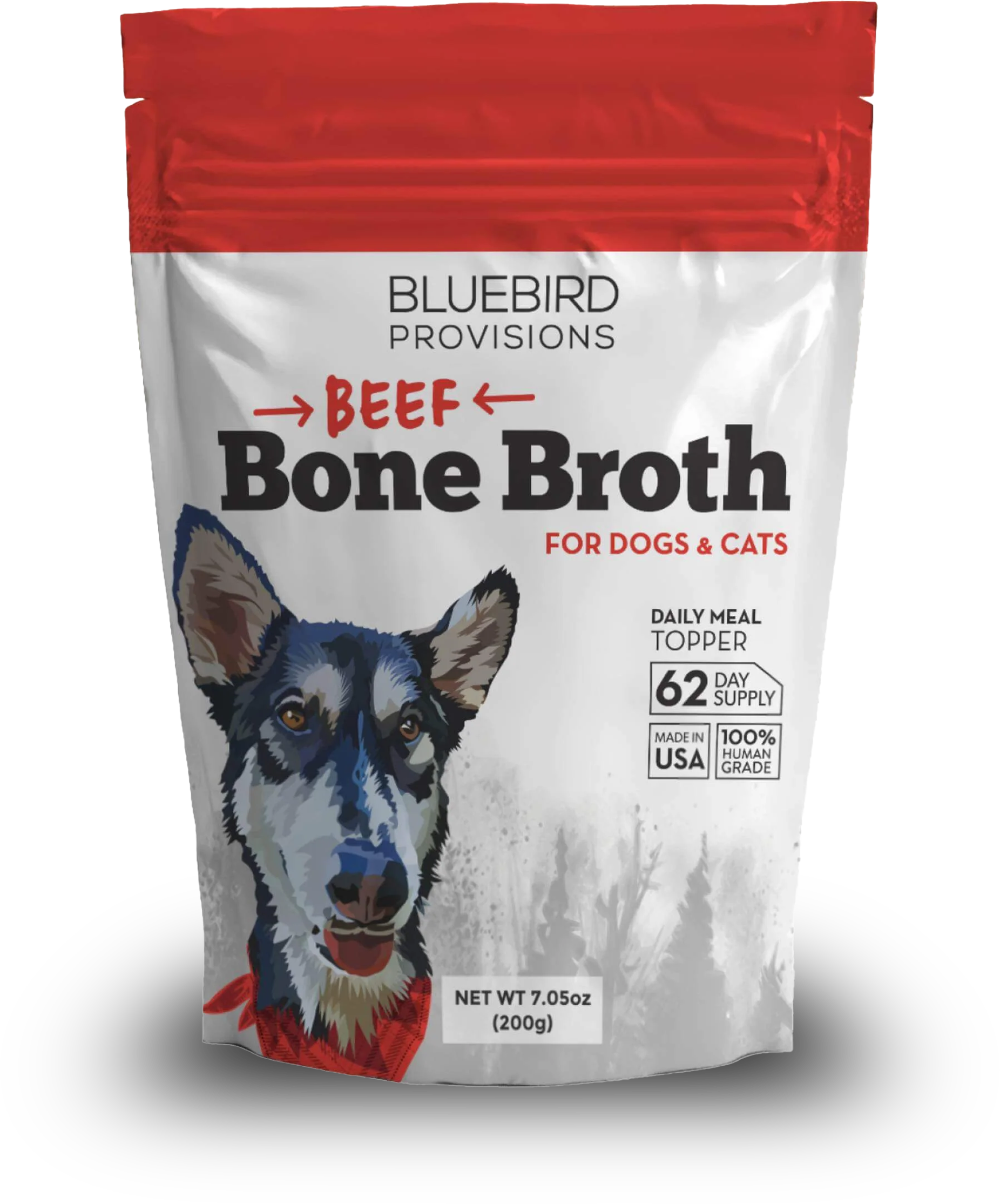
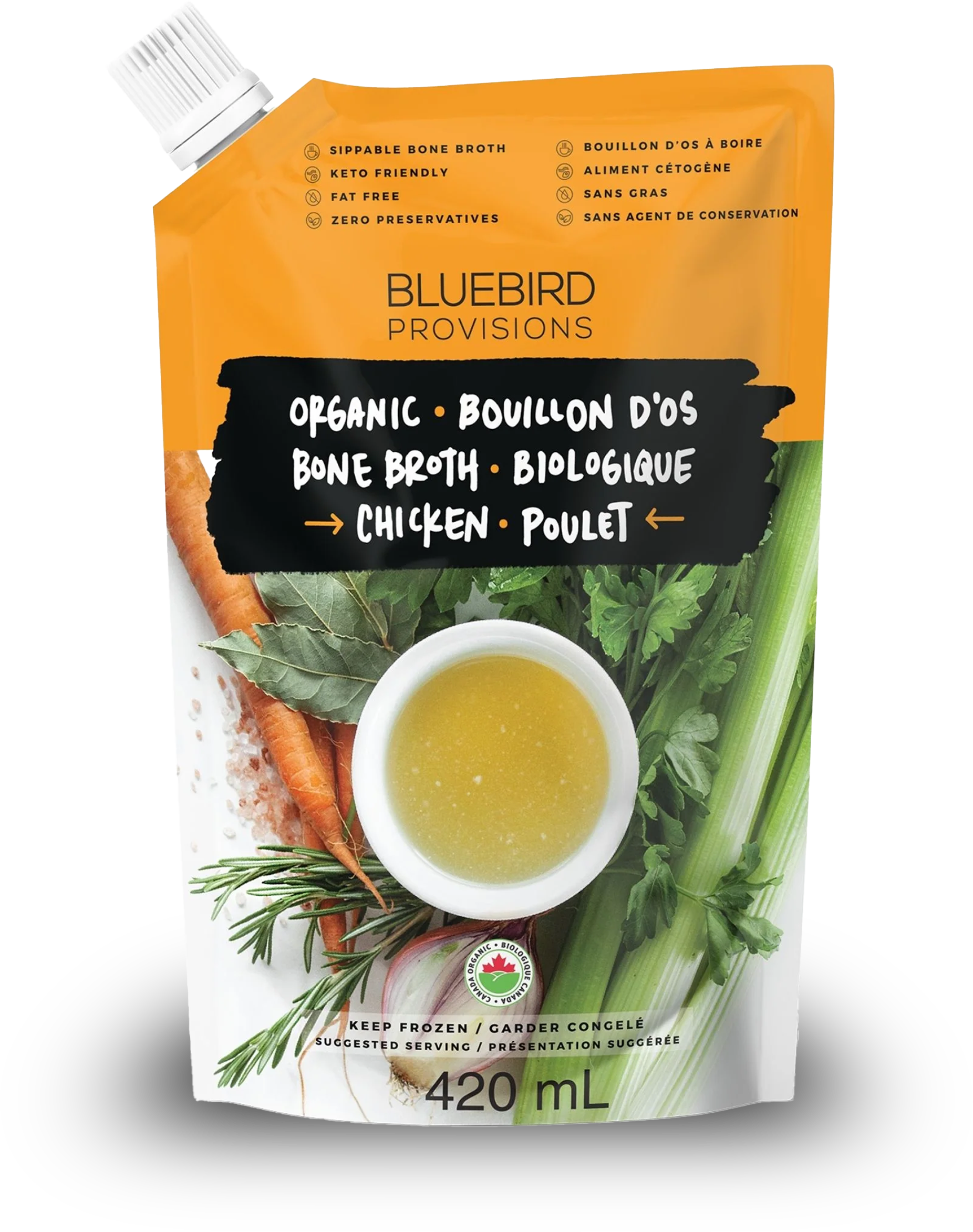
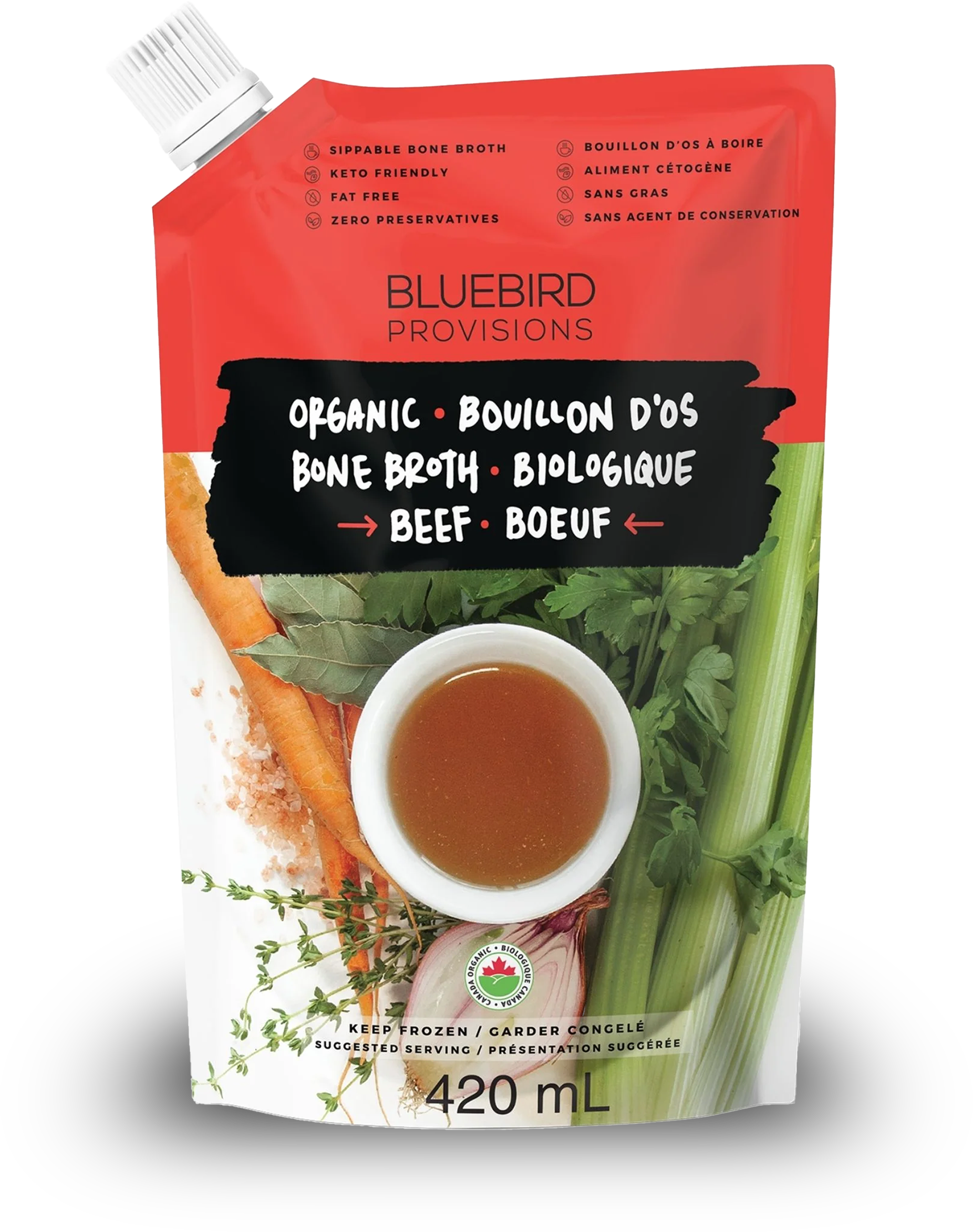

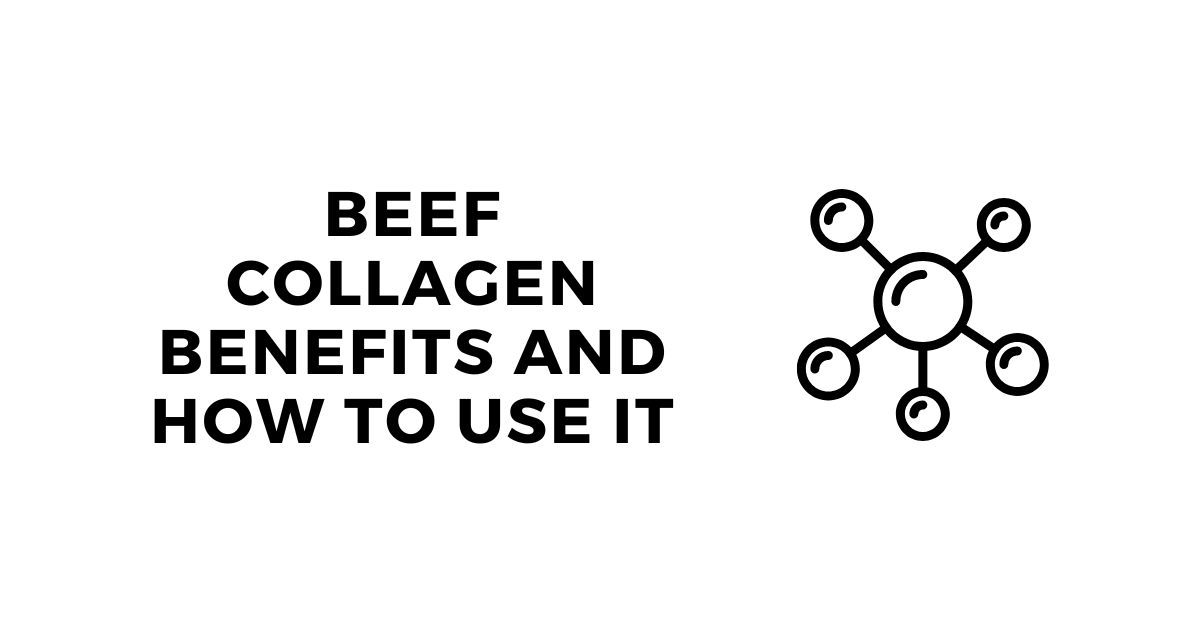
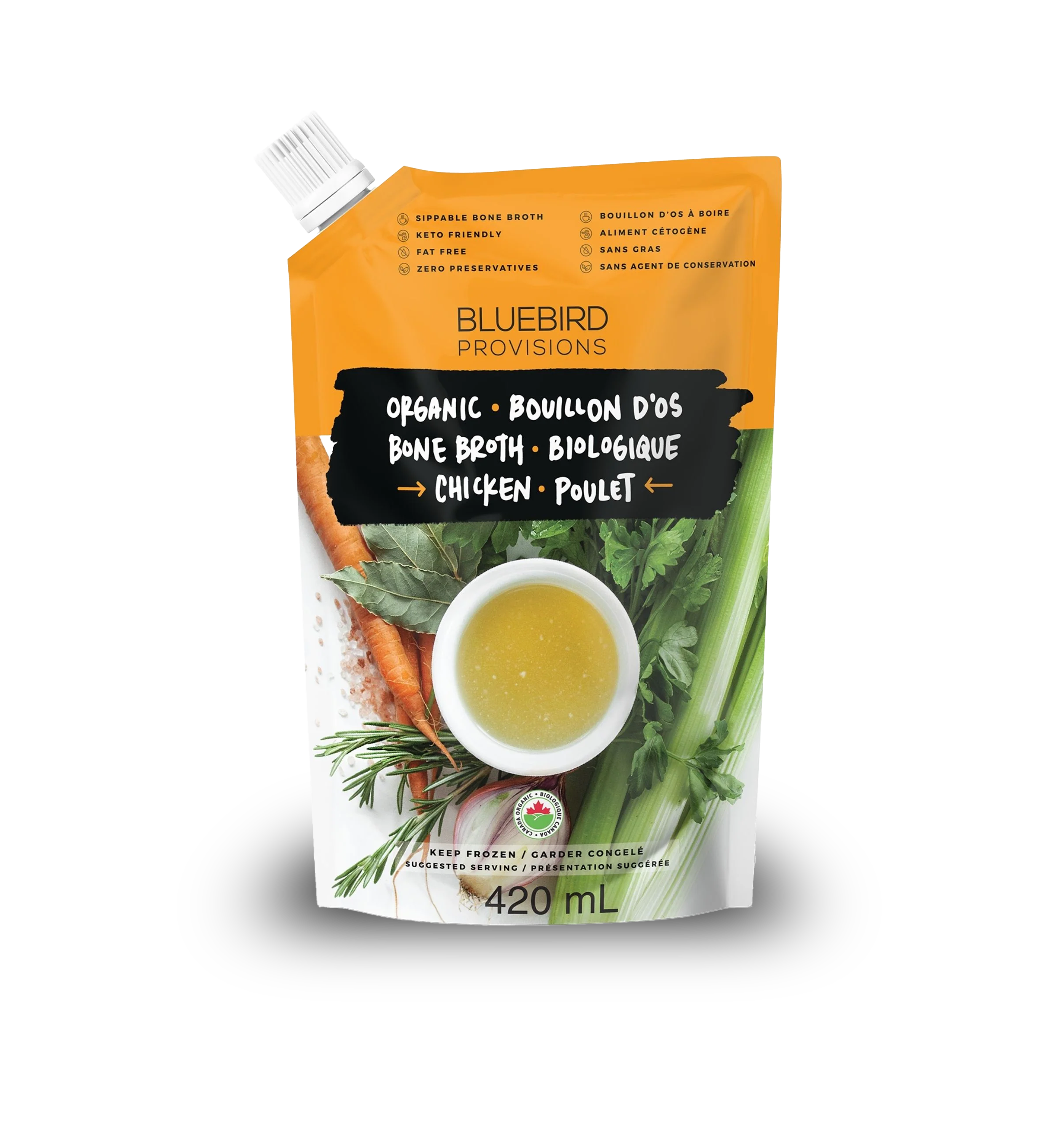
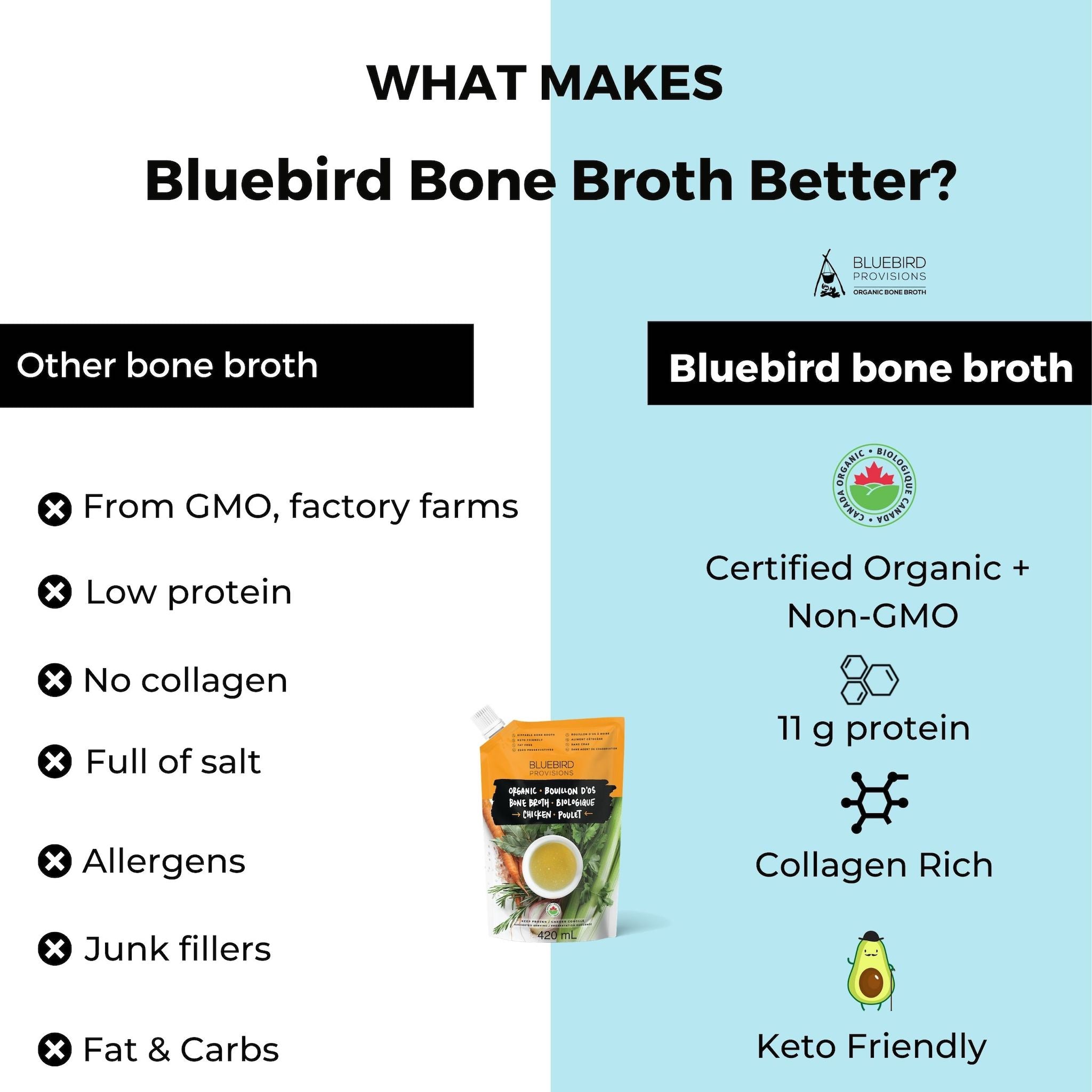
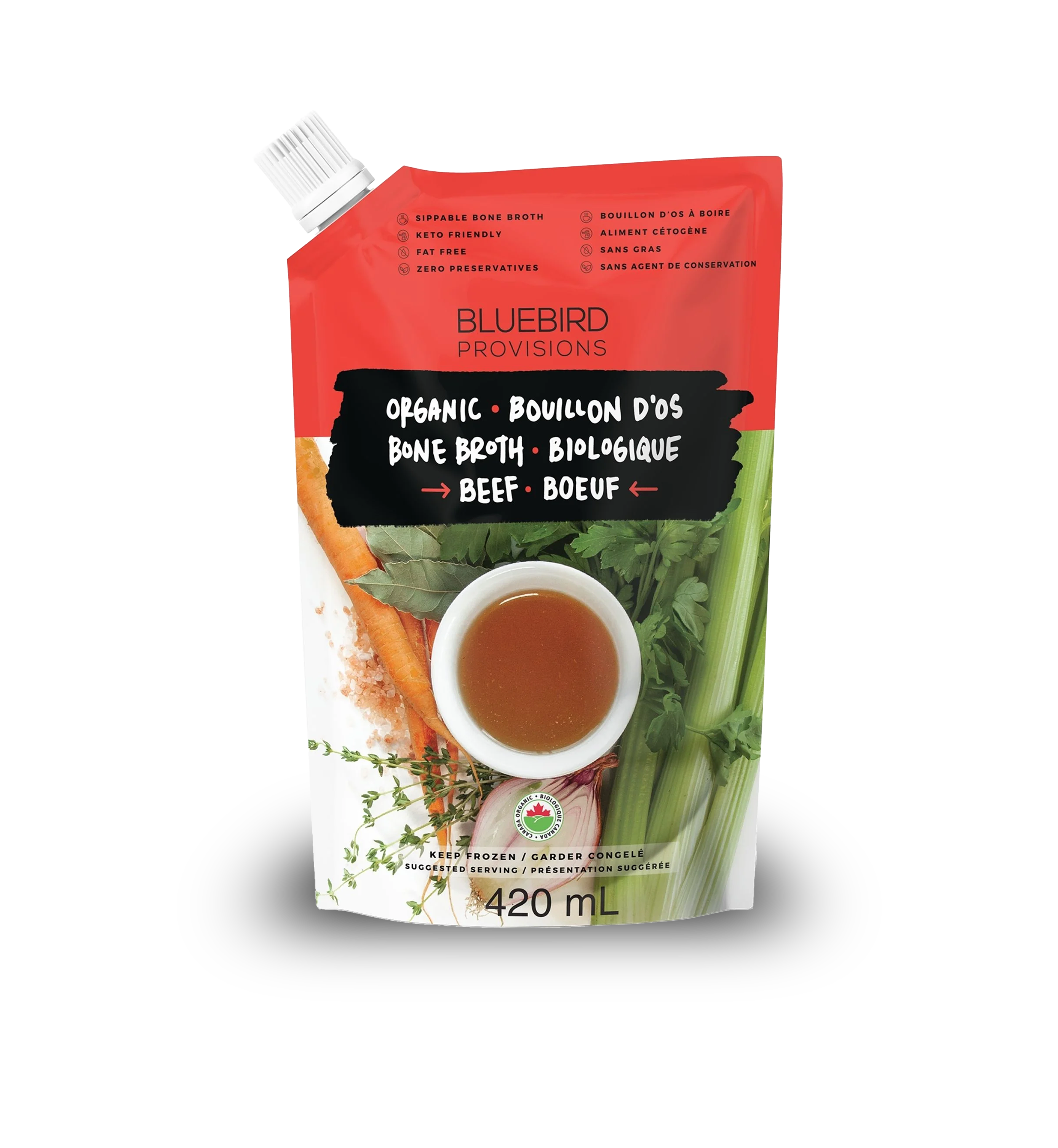
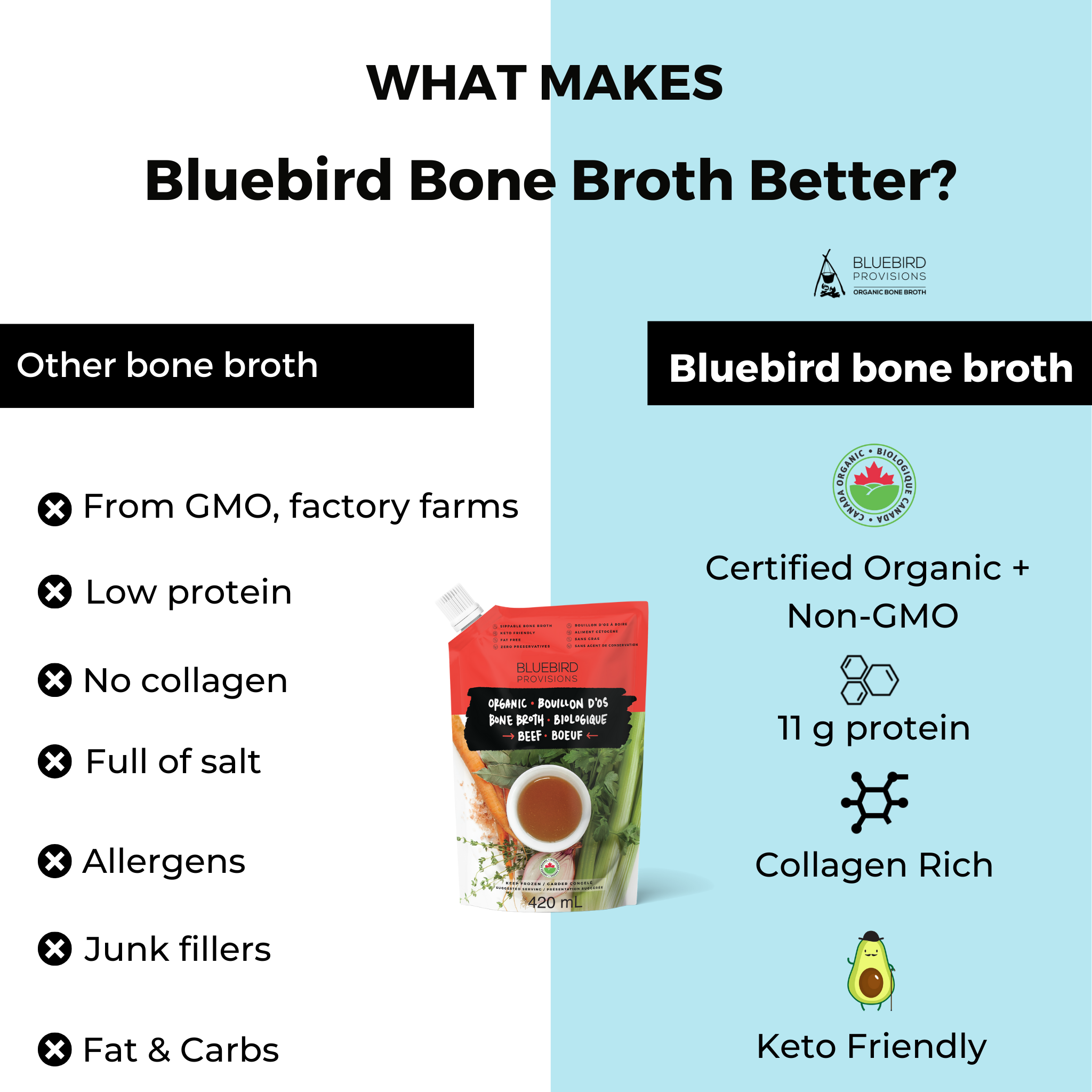
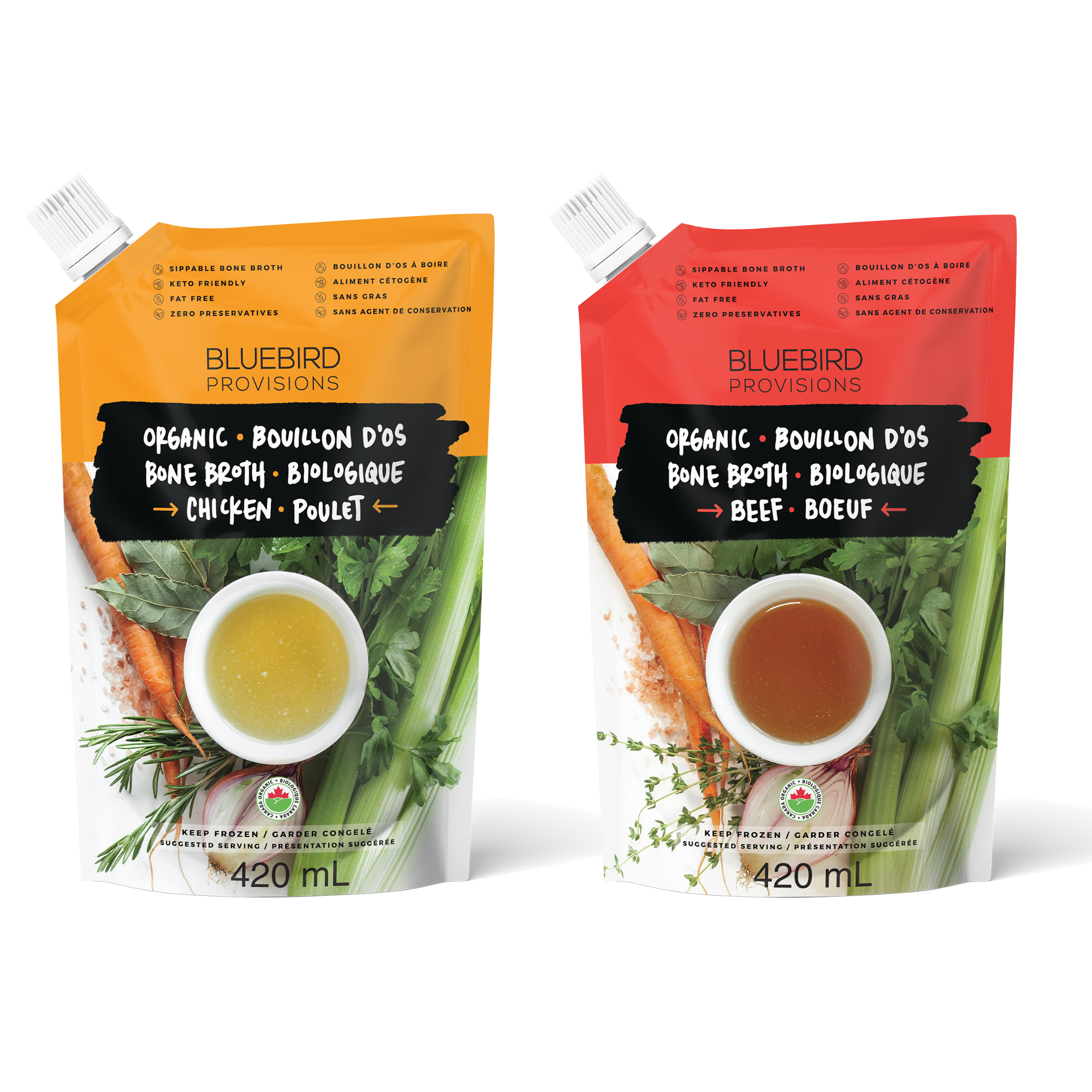

2 comments
That is a great point, thanks for sharing your experience Tara!
Connor at Bluebird Provisions
You’ve left out the fact that collagen from bovine sources causes hormone disruption in some people (like myself) and can also cause issues for people reactions to hystamines. I know from personal experience as someone who never battled skin issues that anytime I’ve tried bovine collagen I break out along my jawline, hairline and back. Marine collagen does not present these issues
Tara
Leave a comment
This site is protected by hCaptcha and the hCaptcha Privacy Policy and Terms of Service apply.